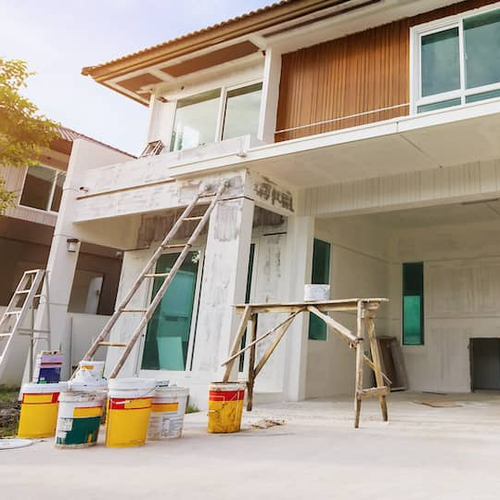Home improvement grants to fund your next repair project
Contributed by Karen Idelson
Sep 25, 2025
•10-minute read

If it feels like an uphill battle to fix and maintain your home, you’re not alone. Across the country, Americans spend thousands of dollars on home repair, putting strain on their financial security.
But you may not have to cover the cost alone. The federal and local government programs help fund home improvement bills for those most in need through home improvement grants. These grants aren’t like home loans; you won’t ever have to pay them back.
Below, we’ll cover what kind of home improvement grants are available, what they’re for, and who is eligible to apply.
Key takeaways
- Only certain homeowners with the greatest financial need qualify for home improvement grants.
- These grants are offered through federal programs, but most state and local governments offer programs as well.
- Don’t just apply for one grant; your best bet is to apply to every grant for which you qualify.
What are home improvement grants?
Home improvement grants provide money to help you update the house you live in. The government provides these grants to those in need to make homes more liveable and safe, so don’t expect them to cover luxuries like a new swimming pool. Instead, you may have more luck funding projects that update essential utilities and disability accommodation.
Federal, state, and county governments back dozens of programs that offer home improvement grants, also known as home repair grants, to bolster strong, healthy communities. However, these grants aren’t for everyone. You must meet strict criteria establishing your need for financing. If those criteria are met, you’ll be competing with many others facing hardship for these limited grants. Research and proper planning will give you the best chance to receive assistance.
Where to find government grants for home improvement
Find the nearest Housing and Urban Development (HUD) field office with a quick online search. They’ll have the most relevant information about local home repair grant programs. Check out the HUD website for more programs and applications.
Some local businesses and non-profits that deal with real estate, community building, and other related fields also offer home improvement grants. Their qualifications and offerings may differ, so be sure to research their programs.
To find more opportunities, follow communication channels used by your community for outreach. These channels could be print publications, in-person events, online newsletters, or social media. There you’ll find the newest updates on home improvement grant offerings.
When applying to grants that you find, expect to provide personal and financial information to prove your need. This information will likely entail your income, dependents, estimated cost of repairs, and possibly other monetary burdens such as medical and childcare expenses. If the application fits within the program, an inspector from the government may visit your home to verify the needs of the repair.
Home improvement grants: at-a-glance
Let’s look at a quick summary of different home improvement grants.
| Type of grant | Possible award amount | What it covers | Who's eligible |
|---|---|---|---|
| HOME Investment Partnerships Program | Dependent on situation |
|
|
| Section 504 home repair program | $7,500 |
|
|
| Native American Housing Improvement Program (HIP) | $7,500 for fixing health and safety issues, $60,000 for fixing building code issues |
|
|
| VA Specially Adapted Housing (SAH) Grant | $121,812 |
|
|
| VA Special Home Adaptation (SHA) Grant | $24,405 |
|
|
| Temporary Residence Adaptation Grant | $49,062 for an SAH grant, $8,760 for an SHA grant |
|
|
Home improvement grants for homeowners
Now let’s go over some of the larger home improvement grants available. Remember, these are designed for specific groups that meet strict guidelines, so they won’t apply to everyone. Be sure to check out local programs as they may be more tailored to your situation.
HOME Investment Partnerships Program
Administered by the HUD, the HOME Investment Partnerships Program provides grants to state and local governments to help create affordable housing options for those living in low-income households. Among the most popular government grants for home improvements, these solutions are often provided in partnership with local nonprofit groups.
How can the money be used?
Grant funds can be used for a wide range of activities, like constructing, purchasing, and rehabbing a property. This applies to affordable housing for both owners and renters. The grant can also be used to provide rental assistance to low-income individuals or families.
Meant to help empower both individuals and communities, funding can additionally be utilized for relocation expenses, demolition of dilapidated housing, and housing site acquisition or improvement.
How to qualify
Eligibility requirements for the HOME Investment Partnerships Program include the following:
- Your income can’t exceed 30% of the HUD-adjusted median family income for your area.
- Rental projects with five or more assisted units must have a minimum of 20% of units occupied by families whose income doesn’t exceed 50% of the HUD-adjusted median family income.
- The initial purchase price, or post-rehabilitation value, of a property utilizing grant funds cannot exceed 95% of the HUD-adjusted area median purchase price.
Section 504 home repair program
If you own a home in the countryside, you may want to look into the Section 504 Home Repair Program. Also referred to as Single-Family Housing Repair Loans and Grants, this program is backed by the U.S. Department of Agriculture (USDA) to provide financial help for rural homeowners who are low-income, elderly, or dealing with disabilities.
With the Section 504 Home Repair Program, you can receive a grant up to $7,500 for your project if you can prove financial need. This is not to be confused with a loan also offered by this program that charges interest.
How can the money be used?
With the Section 504 Home Repair Program, you’ll receive financial help to make your home more livable through various types of improvements:
- Repair or modernize a single-family home
- Replace or fix insulation, the foundation, or septic system
- Improve a home’s energy efficiency
- Remove health or safety hazards
- Make a property more accessible for disabled Americans
How to qualify
To qualify for this home improvement grant, you must:
- Live in a rural area
- Be a U.S. citizen or a legal permanent U.S. resident
- Own and occupy the house
- Be least 18 years old or above
- Be unable to obtain or afford credit from other lenders
- Have a family income that doesn’t exceed 50% of the area’s median income
- Be at least 62 years old and unable to repay a loan
Native American Housing Improvement Program
The Housing Improvement Program (HIP) addresses housing concerns affecting members of federally recognized Tribes. Organized by the Bureau of Indian Affairs (BIA), those who qualify can receive financial assistance with repairing homes, renovations, and obtaining new living arrangements.
How can the money be used?
A safety net designed to end homelessness in Native American communities, the program is crafted to provide all families with a safe home and suitable living environment.
Under HIP’s terms, you can obtain up to $7,500 for housing repairs related to concerns that threaten occupants’ health and safety, and up to $60,000 for repairs or renovations that improve the condition of a property to ensure it meets building code standards. It can also be tapped to obtain replacement or new housing.
How to qualify
To be eligible, you must:
- Be a member of a federally recognized Native American Tribe or an Alaskan Native
- Live in an approved Tribal service area
- Have an income that does not exceed 150% of U.S. Department of Health and Human Services (HHS) Poverty Guidelines
- Have present housing that is substandard, as defined by federal regulations
- Be unable to access other resources for housing assistance
- Have not acquired your present housing through a federally sponsored housing assistance program
Home improvement grant options for seniors
Many home improvement grants are designed specifically to seniors. This is due in part to the passing of the Older Americans Act of 1965. Enacted by congressmembers who observed a growing need to protect senior citizens, this act formed the Administration on Aging, which oversees grants supporting older members of the country. With HUD support, the Administration on Aging supports local programs with federal funding to help seniors get support in their day-to-day needs.
You can explore grants designated for seniors by visiting your state’s Area Agency on Aging offices. Call ahead before arrival to make the most out of your visit. In addition, email local officials about ways you can fund your home improvement projects. They may be able to answer questions and point you toward relevant programs.
Home improvement grants for veterans
As a veteran or experienced service member, you may have unique needs to accommodate physical disabilities or ensure the longevity of your house. The U.S. Department of Veterans Affairs (VA) offers grants to address these needs, which we’ll explore below. Get in contact with your regional VA office to learn more about these and other local grant programs that uniquely serve veterans in your community.
VA Specially Adapted Housing (SAH) Grant
The VA offers SAH grants to veterans and service members who need housing accommodations of disabilities related to their service. With this grant, you can modify your current home with required accessibility features, such as wider doorways or access ramps.
Qualifying applicants can receive up to $121,812. To apply, go through the VA website.
VA Special Home Adaptation (SHA) Grant
The VA also offers an SHA grant that likewise provides funding for those with certain service-related disabilities. This grant provides funds to improve your current or soon-to-be permanent home to help make it a viable long-term living situation.
Apply online on the VA website to see if you’re eligible for this grant providing up to $24,405 in assistance.
Temporary Residence Adaptation Grant
A Temporary Residence Adaptation (TRA) grant is a variant of the SAH or SHA grant designed to support veterans and service members looking to receive funds to help update the home of a family member where they’re currently living. In effect, if you qualify for a SAH or SHA grant and are temporarily living in a family member’s home that needs changes to meet your needs, you may be able to access the TRA grant program.
Under the current terms of the TRA program, if you qualify for an SAH grant, you can receive up to $49,062 in funding, and if you instead qualify for an SHA grant, you can receive up to $8,760 in funding.
Additional financing options for home improvement
What if your grant doesn’t cover the full cost of the renovation? Or what if you don’t meet the requirements for a home improvement grant at all? Don’t worry. You still have many non-government methods to lower your renovation bill.
Cash-out refinance
In a cash-out refinance, your new mortgage will be larger than the one you have currently. This allows you to pay off your previous mortgage and use the remaining funds for the goals of the refinance, such as making home repairs.
Now you have funds to renovate and improve your property. On the downside, this process extends your loan repayment period. If your home renovations are essential and needed immediately, a cash-out refinance’s pros can greatly outweigh the cons.
To qualify, your mortgage must be at least 1 year old, and the title must list at least 1 borrower for the previous 6 months by the time the cash-out refinance pays out.
Home equity line of credit (HELOC)
Another option is a HELOC, a financing process where you borrow against your current home’s equity. This becomes a second mortgage you’ll pay off over time. The benefit of a HELOC is that you can now borrow cash against the equity as credit and use that cash to fund your next repair project.
The big difference between a HELOC and a cash-out refinance is that a HELOC acts as a second mortgage. That puts on you the responsibility of making two mortgage payments every month. A cash-out refinance, on the other hand, replaces your mortgage, so you’ll only have one monthly payment to worry about.
Similar to your first mortgage, the borrow limit and interest rate of a HELOC involve an analysis of your income, credit, and other personal finance metrics. Rocket Mortgage® does not offer HELOCs at the time.
Weatherization Assistance Program (WAP)
The Weatherization Assistance Program (WAP) is provided to help support homeowners in their efforts to make properties safer and more energy efficient. Households that make weatherization improvements and upgrades can save hundreds of dollars a year.
From repairs to caulking and weather stripping, this program provides funding for the installation of energy conservation solutions throughout low-income families’ homes that can help improve residents’ safety and reduce heating and cooling demands. Funds are provided free to eligible applicants.
The bottom line: There are many homeowner grants for home improvement
You have a wide array of funding avenues for your upcoming home repair and improvement project. Take advantage of the many government programs designed to assist everyday Americans with expensive but necessary fixes that they can’t always cover on their own. Federal and local grant programs want to support communities, especially low-income, elderly, and disabled homeowners. Considering both home improvement grants and non-government financing, your next home repair might be more affordable than you think.
If you’re interested in exploring a home equity loan or cash-out refinance, get in touch with us at Rocket Mortgage® today.
*Refinancing may increase finance charges over the life of the loan.

Michael Rosenthal
Michael Rosenthal brings over a decade's worth of experience writing for finance, tech, education, and entertainment. He earned his bachelor’s in writing and a certificate in public & professional writing from the University of Pittsburgh along with a master’s in television production from Boston University.
His previous work includes developing personal finance education for a Fortune 500 company and articles for various mortgage lenders. When he’s not writing for Rocket Mortgage, Michael spends his time fixing up his well-aged home in Los Angeles one leaky sprinkler at a ti
Related resources

8-minute read
VA housing grants for disabled veterans
VA housing grants can provide nonrepayable financial help to make homes more accessible for disabled veterans. Learn more about how these programs work.
Read more
5-minute read
Home remodel costs and estimation template
The amount it costs to remodel a house can vary depending on the scale of the project. Learn the average costs associated with various kinds of remodels.
Read more
7-minute read
A guide for understanding home improvement loans
Home improvement loans can help you finance anything from a few cosmetic changes to a major renovation. Figure out what loan option is right for you.
Read more